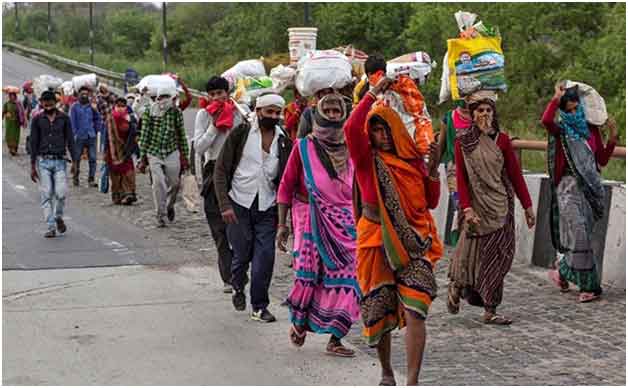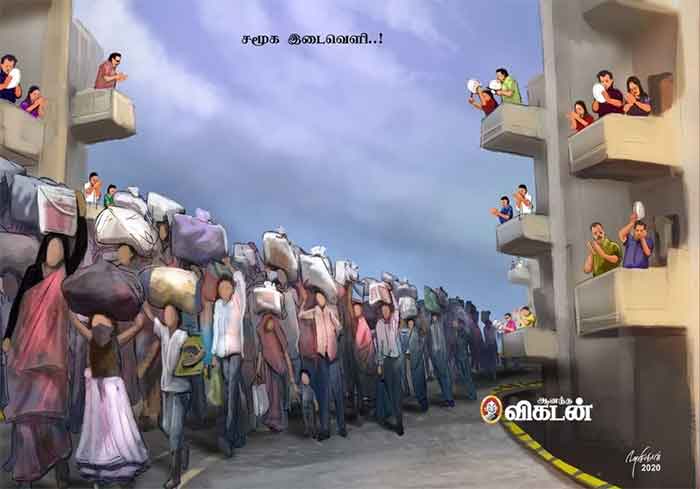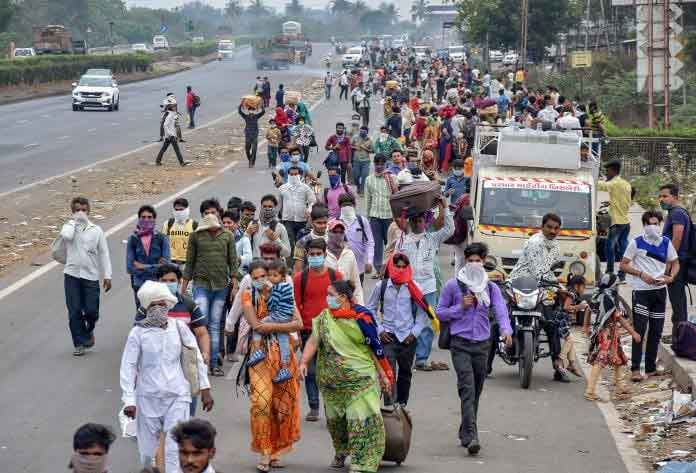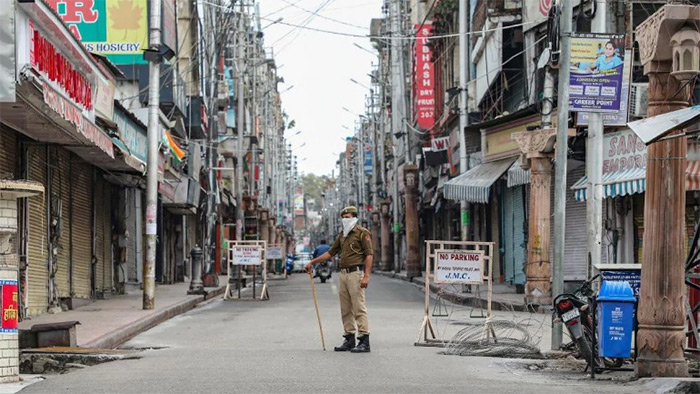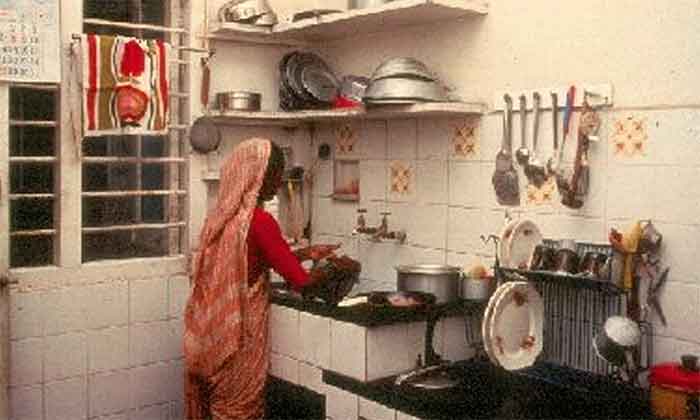Karl Marx had once remarked, “Philosophers have interpreted the world in many ways. But the point however is to change it.” Although, the following narrative which I am going to pen has only one interpretation. The triumph of human will in extreme moments of crisis and the immense possibility that one is capable of churning out to face that crisis.
Writing a tragedy is difficult. Living it isn’t. It has been roaming around our lives and occupying most of our conscious faculties for much too long to not take notice of. It has been given a free pass to enter more often than exit our lives without any prior notice. Sometimes casually while at other times with carefully crafted planning, it embraces us disallowing our basic dignity to bloom amidst the apparent spring. There are only those ‘unlucky’ few who may not have realised its essence in the course of their lifetime. They have never felt or enjoyed what it is to be happy because they never knew what it was to be sad. Their entire life is full of happiness without any shred of sorrow piercing their every existence and questioning their survival strategies. Are you suggesting tragedy be romanticised? “Well! Gosh no.” Not at all. It is only they who are naïve will long for tragedy as an experiment in their life just in order to realise what it is not to be tragic. What I am trying to convey is that sometimes whether we choose tragedy or not, tragedy chooses us and refuses to leave our humble abode for long time to come.
Tragedy is not just the outcome. Tragedy is a process. It takes place every day. At every moment. Not just in someone else’s life in far-away distant land. It refuses to leave even the lives of single human being oftentimes settling permanently till death did them apart. As the world’s largest democracy, India, with more than a billion population declared lockdown on 24th of March 2020 as a popular strategy to win over the pandemic that has brought the entire world to a standstill, how little could have one’s imagination stretched to fathom the kind of tragedy awaiting the lives of its poor and destitute. Following the trend across the globe, I concur that Indian government had very few options left other than declare a nation-wide lockdown of a billion plus population. However, what could have been avoided was improper planning and its even insensitive implementation at the receiving end of which lay the poor and the helpless of the country. While its impact has been manifold on the lives of these people, I shall be focussing on a specific aspect in this narrative. The ‘innovation’ created by these people to counter the crisis took the form of tragedy because of the massive absence of possibilities that left them with no other option. On the other hand, this innovation in the face of crisis is in itself a possibility which they unearthed to survive, for some it may be their last chance of survival.
Before we embark on this journey of acquainting ourselves with the myriad facets of tragedy, it is wise to put some context into it.
Let us travel back to our narration. To feel happiness one has to be a prisoner of hope. Once the prison cell opens it is the brisk pace towards freedom that enables to unlock truths of confinement. It is the hope of this walk that allows one to survive the darkness of limitation within the walls of their existential prison. The people who migrate towards the cities leaving the miniscule comforts of their village life towards an unknown future amidst the cacophony of urban calling, are prisoners of hope. These workers come from different parts of the country to nearby developed cities like Delhi, Bangalore or Mumbai. They arrive from lesser developed places like Agra, Lucknow, Purulia and Telangana. Now if you observe the map of India, it is a huge country. The distance that I am mentioning ranges from 200 kilometres (kms)-700/800 kms; sometimes crossing the 1000 km mark. For some of the workers their family members accompanied them so that they can be the extra earning members. For others, they left their elderly father and mother back in villages depending upon the support of the community members. Carrying whatever is absolutely necessary, they made a choice to search for better sources of survival which was beyond the rural framework, since income from the latter was hardly sufficient enough to meet both ends.
Let us pause for a moment and try and contextualise the scenario. These poor people do not have sufficient means of livelihood in the rural areas. Many of the rural traditional means of livelihood are getting rarer or are dying down due to relentless urbanisation. Let us for example talk of agriculture. Son of a farmer no longer wants to plough a land. He wishes to come to city and search for something higher (in terms of financial remuneration) which may not necessarily be better. These people end up in informal economy and reside in slums. With tough competition for skilled labourers, it will be a surprise to even imagine that these people from rural background with insufficient training be able to make a decent living in the urban areas. Hence, they end up doing odd jobs, just bare minimum for survival. They engage as construction workers, manual scavengers, rickshaw pullers, taxi drivers, house maids, textile workers, sweepers, shopkeepers, and tiny road-side stall owners. So much for urbanisation! Therefore they forever remain caught up in this vicious cycle of poverty – low education, low skills and low wage in the hope that may be their next generation will be in a position to live a decent life. But with resources remaining in the hands of the few which no one wishes to share, poor people forever remain in this cycle. Without modifying the structure they continue to remain neglected and exploited for generations.
With lockdown suddenly announced within a span of four hours (with the intention of minimising crowd and its intermingling) , these workers in the informal sector had to stay back in the city. They could not go back to their homes in the villages. Gradually over the period of the lockdown as the informal work began to shut down, their meagre income and even lesser savings dwindled. Eagerly waiting for the fortnightly announcement of further lockdown began to impact their mental well-being. Although spending time on worrying about mental well-being is a luxury for these people when their physical well-being is at the brink of demise. With small informal economies unable to sustain without any work for weeks, these workers began to be denied their wages. As most of these informal economies do not fall under the purview of government regulation, exploitation is rampant and so is flouting of government rules. With all the modes of transportations closed and no money, left, these people had to search for a way out to survive. Before the virus could actually kill them; it will be their poverty and desperation that will push them towards death. Between deciding to stay in cities with no work-no pay and thereby eventually fearing the worst for them or finding out a possibility in this dire need of crisis – they decided to choose the latter. And what did they innovate? They decided to walk. They decided to walk back home. Yes, they decided to tread the long, arduous and seemingly impossible journey back home with their children.
As we sat in our balconies sipping the morning tea (our British legacy!), we scrolled our costly tablet for news. And news there was no dearth of! As the long marches commenced, heart wrenching pictures of men, women and children filled our electronic commodity. For people like us, it was an utter shame of guilt and grief that engulfed our existence. With no transportation in sight, walking back home was the only option left during this crisis. Walking was an innovation. It was a possibility of an attempt to survive. Amidst the structural injustices of insensitive urbanisation and looming hunger, walking transcended as a symbol of hope. A hope which can be seen. A hope which was tangible. A hope which would take all of us into the adventurous road trip where every step, every torn cloth, every sweat drop, every crying child, every pregnant woman was a constant reminder to not give up, no matter how difficult the circumstances turn out to be.
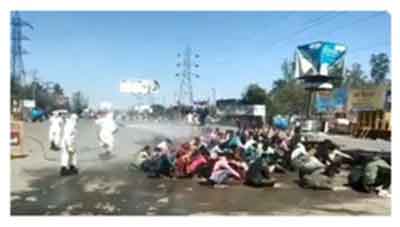 As the migrants began their walk back home, the wrath of the law enforcement began to manifest its ugly face on the poor and the helpless. While the police were simply performing their duty, the duty somehow lacked the element of empathy and sensitivity. In order to enforce stricter lockdown, police began to harass them – after walking for miles when they reached the border of another state, police stopped them from entering or asked them to wait without any notice as to how long their wait would last or sprayed them with DISINFECTANT to clean them of any possible germs (picture provided source: BBC). These are one of those rare moments in a Nation’s history which stands testimony to its dehumanising manifestation towards its own citizens. More than the physical exhaustion of having treaded unfathomable miles, it was the constant humiliation which was intolerable. But then I guess, these people should not possess the luxury of self-respect since their survival was more valuable which cannot be traded for mere self-respect. They had to choose one or the other.
As the migrants began their walk back home, the wrath of the law enforcement began to manifest its ugly face on the poor and the helpless. While the police were simply performing their duty, the duty somehow lacked the element of empathy and sensitivity. In order to enforce stricter lockdown, police began to harass them – after walking for miles when they reached the border of another state, police stopped them from entering or asked them to wait without any notice as to how long their wait would last or sprayed them with DISINFECTANT to clean them of any possible germs (picture provided source: BBC). These are one of those rare moments in a Nation’s history which stands testimony to its dehumanising manifestation towards its own citizens. More than the physical exhaustion of having treaded unfathomable miles, it was the constant humiliation which was intolerable. But then I guess, these people should not possess the luxury of self-respect since their survival was more valuable which cannot be traded for mere self-respect. They had to choose one or the other.
With all the road-side stalls closed, the highway meal points shut, for the walking migrants the next cause of trouble came with the unavailability of food. The destination would take more than a few days to reach. Whatever little they had gathered was already over sometimes later. Hence, they survived on nothing but hunger. Even water was unavailable in the scorching heat of the March-April morning when the lines of migrants kept getting longer. A caring Samaritan passing by in his car feeling the pain of the migrants would provide whatever little he possessed to avoid the eyes of guilt when he stands infront of the mirror. It is the call of the guilty conscious that provokes one to empathise with one another. However, there is no altruistic motif behind such random acts of kindness. One found plethora of examples of people’s goodness during this time of crisis which were somehow lost somewhere in the daily human struggles of existence. People went out of their way to stand by their fellow citizens in these extreme moments of grief and anguish.
Food gradually became hierarchical. It had always been such. But in these times of crisis, the only possibility was to provide food to the children first, then the women and finally came the male. Families began to beg for food for their children from the people passing in cars which definitely was a rarity during strict lockdown. The reporters who reported the stories were faced with extreme sense of dilemma whether to give them a ride in the car or just continue with their job of reporting to the entire world of the Indian State’s apathy and indifference to its lesser fortunate. Their walks continued unabated for days and nights along lonely highways overcoming extreme sense of helplessness. Their only hope that one of these days they will for sure reach their home. A home where they can atleast attempt to survive ; give death a last escape and take a chance with life. It was with this hope that they had been carrying their wailing children and tattered belongings miles after miles.
A faceless narration may not appeal to the conscience of a reader unless it takes some form of shape. Let me narrate some anecdotes from this narration. Let me put some faces in these stories. They have been picked up randomly without putting them under a scientific scanner of selecting criteria for plausible case studies.
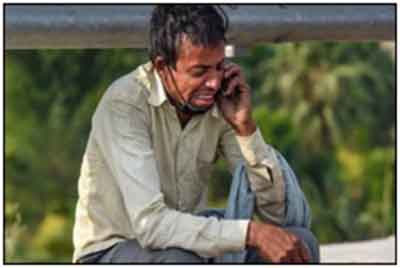
An image of an elderly man went viral one day in the newspaper and the social media. Or was it simply his life burden that made him looked older than he actually was, is difficult to guess. He was talking over his small cell phone and was crying inconsolably. Thank god for the photographer who clicked the heart wrenching photo and then went on to detail the story behind his tears. The migrant is Rampukar Pandit. From Delhi he was walking to his home in Bihar covering a walk of 1200 kms. He was stranded beside the road for three days as the police did not allow him to cross the border. He was desperate to reach home to meet his dying son. His one year old dying son. He had done everything in his
capacity to reach home before the inevitable. However, by the time he had managed to reach, his son had died from stomach infection and worst of all his relatives had to complete his last rites even before Rampukar could reach home. It was in his moment of desperation when the photo went viral. Even if we did not know the story behind the photo, the pain in this photo is all too visible.
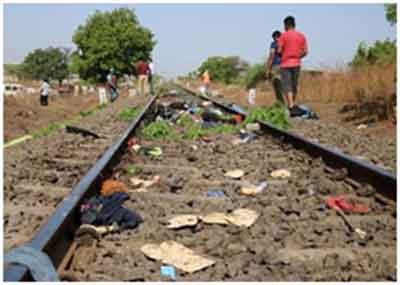
16 migrant workers were run over by train. Obviously, the question remains what were they doing on the tracks. They have been walking for some days. Mobiles phones had died down. Moreover when one is walking 1000’s of kms, hardly anyone has the strength to check the latest updates. Poor and tired migrants thought to take some rest on the tracks the moment they were exhausted in the night after the long walk under the assumption that trains were not running during the period of lockdown. But some trains were covering its allotted destination on schedule (primarily goods train) when it ran over the sleeping men in the dead of night. From the comforts of our home we can definitely pass our judgements how ‘stupid’ their acts must have been. But the image said a thousand words and even more; more than the walk they had covered to reach back home. With the hope of reaching home they succeeded in reaching death. With dry rotis (Indian bread) strewn all across the railway track, the image will stay with us for long time to come.
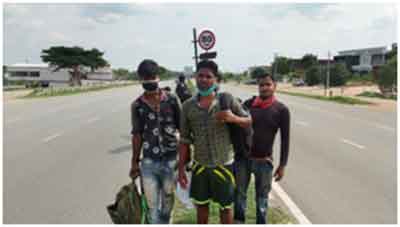
This is the story of Rajesh Chouhan. 10 days and 1250 miles back home from the southern city of Bengaluru to northern state of Uttar Pradesh. Tired, exhausted and blistered could best describe his position. Trying to escape from police check point near the state boundaries, he had been surviving on tea and biscuits. He said, “We were beaten many times. Just because we are poor, doesn’t mean we can’t feel pain,”. Thank heavens he is only 26 and did not have family with him. What else could we pray for him!
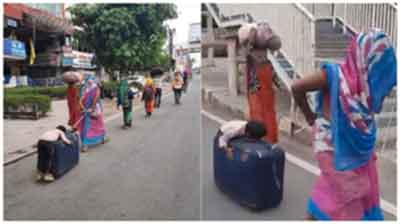
Exhausted child being carried by his mother on the wheels of a suitcase left netizens awestruck. Crisis bring the best of possibility within us. But who would have fathomed the love of a mother towards her child or such humane use of the wheels in a suitcase. Whatever little comfort she could provide in times of helplessness, she decided to apply her mind to put her child to rest. It was a double pain for her – to swallow her own
exhaustion and to pull the suitcase simultaneously. But who cares when it comes to the comforts of her own child!
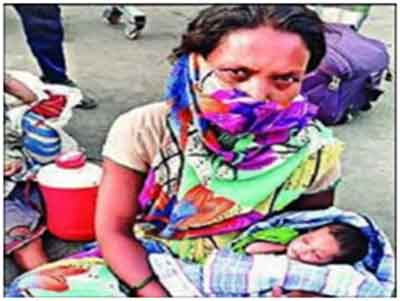
With doctors specialising in different aspects of women’s pregnancy ranging from pre-natal to neo-natal to post delivery, they would never have imagined a delivery like this. She was walking when she experienced labour pain, gave birth, rested for two hours and finished her walking of 150 kms to reach back home. From Nasik in Maharashtra to Satna in Madhya Pradesh – that was all she was walking. ‘Not much’, I suppose in extreme pain of pregnancy. She delivered her baby on the road without the minimum medical assistance and medications. But as hope would have it, both of them are doing fine. Possibilities are immense and so are human endeavour and grit.
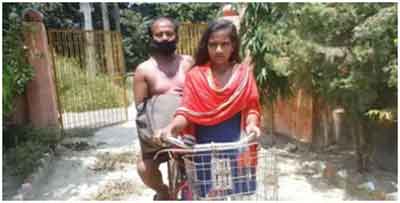
And before I draw a curtain to these faces and let them get lost in our oblivion for ever, I shall share a positive story of love, grit and human capacity. Jyoti Kumari is a 15 year old teenage girl. The word teenage does not carry much of a meaning in the sense of the term we use or know it. Though for her my be, she is expected to get mature before her age. She cycled her ailing father from Gurugram in Haryana to Darbhanga in Bihar covering a total of 1200 kms. She may not win any cycling race. But what she has achieved to do as a daughter in her age sparks hope and inspiration. Although people kept offering her food and water on the way , however, that was not sufficient for two persons. Therefore whatever little she had, she would offer it to her ailing father and she herself would go hungry for days. But human determination is everything and can never deter no matter what the circumstance be like and how agonising the journey appear to be.
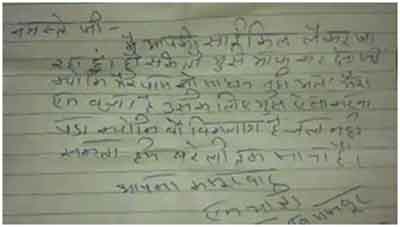
Last but not the least. Humanity at its best. Discourses in our media often renders note of surprises on witnessing acts of kindness or moments of empathy of the poor. Statements like ‘he is poor yet honest’ is not only derogatory but obnoxious and reeks of our perceived superior nature. A migrant who wants to carry her differently abled son steals a bi-cycle and leaves an apology note. Mohammad Iqbal stole a cycle from a village in Rajasthan to carry his son back to Uttar Pradesh. The letter reads, “Namaste ji, Main apki cycle lekar ja raha hu. Ho sakey toh mujhe maaf kar dena kyunki mere pass koi sadhan nahi hai aur ek bachcha hai uske liye mujhe aisa karna pada kyunki woh viklang hai, chal nahin sakta. Humein Bareilly tak jaana hai (Hello, I’m taking your bicycle. Please forgive me if you can as I had no other option and I have a child for whom I did this. He is specially-abled and cannot walk. We have to go to Bareilly).”
Later, when world will begin to run its normal course and life will once again stand to face the reality, all these tales must not be lost in the yellow pages of history. They remain to be told and retold to the future human race. To let people know of human sacrifice, courage, determination, and hope. As the pandemic will forever remain as an iconic phenomenon in our lifetimes, so will these stories of human lives. It will be hard to replicate them. It will be hard to find voices to their souls. Words might fall short to describe the exact feeling. All that will remain are these faces and their journey. Their struggles in extreme moments of desperation to overcome the unimaginable, will forever be etched in our conscience. When stories of Covid will be written by famous authors, or rhymes be created by popular poets or a painting be drawn by some artist somewhere in some obscure parts of the world, let these tales remain occupied some corner of our memory books. All these deaths should be counted under Covid. The death from Covid isn’t only a medical condition. It is a complex dovetailing of social, cultural and economic aspects that entangle the life of the poor and the helpless. Whether through such an outlook will we be able to change the world or not is difficult to predict, but atleast it will be beyond a Philosopher’s paradise of simply interpreting the world as Marx had anticipated and feared.
Suparna Banerjee , Junior Researcher Zentrum für Entwicklungsforschung (Centre for Development Research) University of Bonn, Germany
GET COUNTERCURRENTS DAILY NEWSLETTER STRAIGHT TO YOUR INBOX

